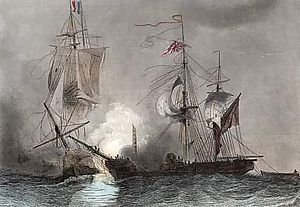French frigate Alcmène (1811)

HMS Venerable fighting the French frigate Alcmène on 16 January 1814
|
|
| History | |
|---|---|
|
|
|
| Name: | Alcmène |
| Laid down: | July 1810 |
| Launched: | 3 October 1811 |
| Captured: | 16 January 1814 |
|
|
|
| Name: | Dunira |
| Acquired: | 16 January 1814 (by capture) |
| Renamed: | HMS Immortalite |
| Fate: | Sold 1837 |
| General characteristics | |
| Class and type: | Armide-class |
| Type: | frigate |
| Length: |
|
| Beam: | 39 ft 10 in (12.14 m) |
| Depth of hold: | 12 ft 7 1⁄2 in (3.848 m) |
| Propulsion: | Sails |
| Complement: |
|
| Armament: |
|
The French frigate Alcmène was an Armide-class frigate of a nominal 44 guns, launched in 1811. The British captured her on 1814. The Royal Navy named her HMS Dunira, and then renamed her HMS Immortalite but never commissioned her nor fitted her for sea. In March 1822 she became a receiving ship at Portsmouth. She was sold in January 1837.
In 1813, along with Iphigénie, she served at Cherbourg, in the squadron of contre-amiral Amable Troude, to protect the harbour.
On 16 January 1814, the 74-gun third-rate ship of the line Venerable, her prize, the ex-French letter of marque brig Jason, and Cyane were in company when they spotted two 44-gun French frigates, Alcmène and Iphigénie. Venerable joined her and after a chase that left Cyane far behind, captured Alcmène, though not without a fight. Venerable lost two men dead and four wounded, while the French lost 32 dead and 50 wounded. Alcmène had a complement of 319 men under the command of Commander Ducrest de Villeneuve, who was wounded when he brought her alongside Venerable and attempted a boarding.
Jason and Cyane tracked Iphigénie and initially fired on her but broke off the engagement because they were outgunned. Cyane continued the chase for over three days until Venerable was able to rejoin the fight after having sailed 153 miles in the direction she believed that Iphigénie had taken. On 20 January 1814, Venerable captured the quarry, having again left Cyane behind. She apparently did not resist after Venerable came up. Before meeting up with the British ships, the two French vessels had taken some eight prizes. The action resulted in the award in 1847, to any surviving claimants, of the Naval General Service Medal with clasps "Venerable 16 Jany 1814" and "Cyane 16 Jany. 1814".
...
Wikipedia
